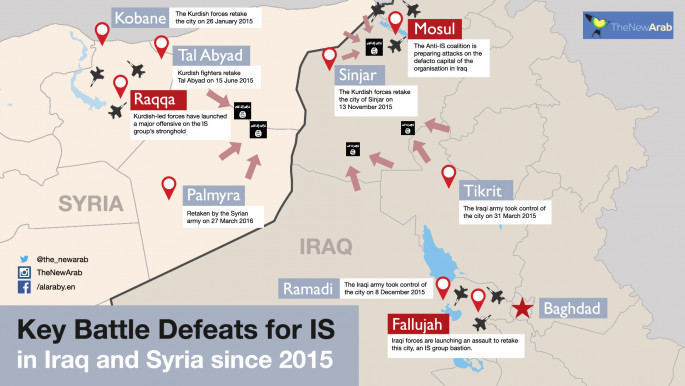Iraq: IS mounts surprise attack on 'liberated' Anbar town
The Islamic State group (IS) advanced on Sunday in the Iraqi town of Hit following violent clashes with Iraqi military forces, sources said.
"Iraqi troops failed to deter a sudden IS attack on the eastern side of Hit," a security source told The New Arab.
"Violent clashes are currently taking place in al-Jari street, and Iraqi troops have requested reinforcements to control the situation," the source added.
"Several explosions, thought to be caused by IS car bombs, can be heard in the town."
Hundreds of families have begun to flee the town towards the neighbouring town of Kubaysa in search of a safe refuge, according to one of the town elders.
Sheikh Faleh al-Namrawi called on the government to contain the situation and send urgent military reinforcements to stop the advance of IS militants.
"Iraqi troops are not prepared for the ongoing violent clashes with IS," he told The New Arab, "and they need air support and reinforcement."
Iraqi and coalition officials say Hit - which lies along the Euphrates river valley in Iraq's vast Anbar province - is strategically important as it sits along an IS supply line that links the extremist militants in Iraq to those in Syria.
 |
Last month, Iraqi forces announced the full liberation of the town from IS control, following clashes that lasted over a month |  |
 |
| [Click to enlarge] |
Last month, Iraqi forces announced the full liberation of the town from IS control, following clashes that lasted over a month.
Aid agencies, including the Red Cross, voiced concern for the estimated 35,000 forced to flee from Hit in preparation for the battle.
The town had been under IS control since the militants overran the area in October 2014.
IS still controls much of northern and western Iraq, but has been driven back in recent months in some areas, such as the cities of Ramadi and Tikrit.
![Iraqi force fighting IS in Anbar [Getty] Iraqi force fighting IS in Anbar [Getty]](/sites/default/files/styles/image_345x195/public/media/images/EEA2D8AB-3C08-483E-99D5-59DC0A8CB68B.jpg?h=d1cb525d&itok=vZBLM_R_)




 Follow the Middle East's top stories in English at The New Arab on Google News
Follow the Middle East's top stories in English at The New Arab on Google News

![Israeli forces ordered bombed Gaza's Jabalia, ordering residents to leave [Getty]](/sites/default/files/styles/image_330x185/public/2176418030.jpeg?h=a5f2f23a&itok=_YGZaP1z)
